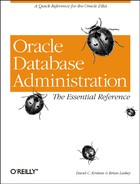 Disk Allocation
by Brian Laskey, David C. Kreines
Oracle Database Administration: The Essential Refe
Disk Allocation
by Brian Laskey, David C. Kreines
Oracle Database Administration: The Essential Refe
- Dedication
- Preface
- I. DBA Tasks
- 1. Introduction
- 2. Installation
- 3. Maximizing Oracle Performance
- 4. Preventing Data Loss
- 5. Oracle Networking
- Oracle Names
- MultiProtocol Interchange
- Connecting to Non-Oracle Databases
- Network Manager Data Storage
- Using Network Manager
- Files Created by Network Manager
- Oracle Net8 Assistant
- Manual Network Configuration
- Sample SQL*Net Files
- SQL*Net Troubleshooting
- 6. Security and Monitoring
- 7. Auditing
- 8. Query Optimization
- 9. Oracle Tools
- 10. The Oracle Instance
- 11. The Oracle Database
- 12. Initialization Parameters
- 13. SQL Statements for the DBA
- SQL Commands by Task
- SQL Command Syntax
- Reference Section
- Reference Section
- Reference Section
- Reference Section
- Reference Section
- Reference Section
- Reference Section
- Reference Section
- Reference Section
- Reference Section
- Reference Section
- Reference Section
- Reference Section
- Reference Section
- Reference Section
- Reference Section
- Reference Section
- Reference Section
- Reference Section
- Reference Section
- column_constraint_clause
- auto_extend_clause
- for_clause
- filespec
- autoextend_clause
- global_index_clause
- local_index_clause
- table_constraint_clause
- table_ref_clause
- column_ref_clause
- column_constraint_clause
- index_organization_clause
- segment_attrib_clause
- partition_clause
- autoextend_clause
- 14. The Oracle Data Dictionary
- Static Data Dictionary Views
- Dynamic Performance Data Dictionary Views
- 15. System Privileges and Initial Roles
- 16. Tools and Utilities
Disk Allocation
In a typical installation, Oracle tends to be I/O bound. Database transactions are slowed by waiting for one or more input/output operations, rather than by waiting for the CPU to complete an operation. Because the database is so dependent on I/O, overall Oracle performance can be improved, sometimes dramatically, by improving the overall performance of the I/O system on the host server. While there are several ways I/O performance may be improved (for example, by using faster disk drives or more controllers), one relatively easy way to improve I/O is by carefully allocating physical disk resources to Oracle.
Each time an Oracle table is updated, the following I/O operations are performed:
The write to the table
Reads and writes to any indexes
Reads and writes to the temporary tablespace if large sorts or joins are involved
Writes to the rollback segment for the table
Writes to the rollback segment for any indexes
Writes of the redo log buffer to disk for the table
Writes of the redo log buffer to disk for any indexes
Writes to the data dictionary if new extents are needed
In addition, if the database is running in archivelog mode, then at any given time the ARCH process may read from one of the online redo log files and write a copy to the archive log destination.
-
No Comment